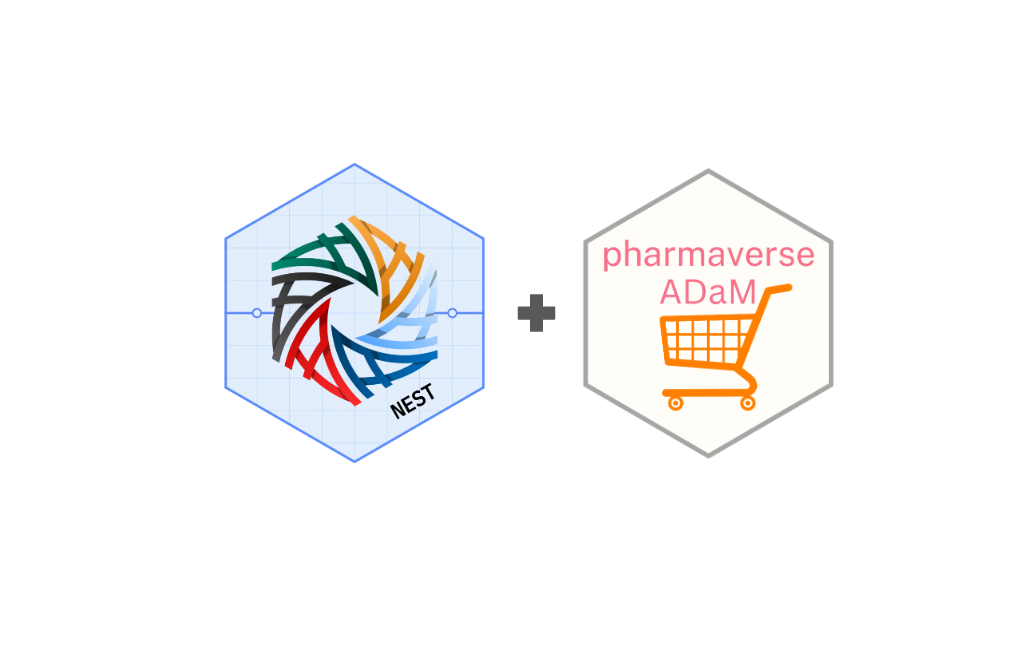
Introduction
In the dynamic world of clinical research, innovation and collaboration are key drivers of success. The NEST and {admiral} teams exemplify this through their groundbreaking packages. By leveraging open-source tools and fostering a community-driven approach, they have significantly advanced data integration and reporting methodologies in the clinical research setting. This story celebrates one of the first occasions in which the NEST and {admiral} were able to join forces and collaborate.
Who are the NEST Team?
The NEST team, an acronym for Next-Generation Exploratory and Standardized Tools, has pioneered a collection of open-sourced R packages designed to expedite insight generation under clinical research settings. Originating at Roche, NEST has attracted a diverse array of collaborators from academia, the pharmaceutical industry, and clinical research institutes, largely due to efforts like pharmaverse. Their mission is to accelerate clinical reporting and welcome contributions from the broader scientific community.
Who are the admiral team?
Focused on a complementary goal, the {admiral} team is dedicated to providing an open-source, modularized toolbox for creating ADaM datasets in R. Their approach is transparent and collaborative, empowering users to co-create and refine a harmonized methodology for ADaM development across the pharmaceutical industry. The {admiral} team designs their tools to be user-friendly and versatile, capable of addressing a wide range of data requirements.
Setting the Stage for Collaboration
Over a year ago, an opportunity for collaboration was identified within NEST and {admiral}. Indeed, the NEST team was reliant on simulated data for integration testing and powering of its TLG Catalog, which often lacked realism and failed to cover edge cases or expose software limitations. Through conversations within the pharmaverse, it was realized that some of these challenges could be addressed by switching to using the more realistic test data offered by the {pharmaverseadam} package (maintained by the {admiral} team). The source of the data within {pharmaverseadam} is the is real SDTM data published through the CDISC Test Data pilot, converted into ADaM by running the {admiral} template programs on it.
This potential pivot would beneficial for both teams. For one thing, it would allow the NEST team to achieve more realistic and comprehensive testing, thus enhancing the robustness of their development work. Simultaneously, it would mean that the {admiral} team would receive feedback from NEST about the robustness of both the {pharmaverseadam} datasets and the templates used to generate them.
Key Achievements
The following months were a period of collaboration for the two teams as this switch was enacted. Numerous achievements were identified:
Realistic Data Integration: Transitioning from simulated to more realistic data provided the NEST team with more accurate and relevant testing conditions. This change was crucial in identifying and rectifying potential software limitations.
Scope and Dependency Management: Both teams agreed to avoid creating strong interdependencies that could extend release cycles. NEST packages maintained minimal data for documentation purposes, while
{admiral}preserved extensive datasets separately.CI Integration and Automation: On the NEST side, new CI integration tests ensured that template updates were automatically verified against stored
{pharmaverseadam}datasets. This maintained consistency and allowed developers to identify intended changes promptly.Strategic Pipelines: A pipeline was established in
{pharmaverseadam}so that any updates to the{pharmaversesdtm}source datasets and/or the{admiral}template scripts can trigger an update to{pharmaverseadam}.
Recent Developments
The collaboration bore fruit as the teams uncovered critical insights and improvements. For instance, using the {pharmaverseadam} data in the {scda.test} package helped the NEST team identify and correct issues in their table template development, specifically in calculating denominator values. The realistic test data also revealed minor inconsistencies in the derivation of ECG data within the {admiral} templates, which were promptly addressed, enhancing data quality.
Conclusion
The collaboration between the NEST and {admiral} teams showcases the power of open-source initiatives and community-driven efforts such as the pharmaverse in advancing clinical research. By integrating realistic data and refining their testing processes, they have significantly enhanced the robustness and reliability of their tools. This partnership not only accelerates insight generation but also cultivates a culture of collaboration and innovation, benefiting the broader pharmaverse community.
The success of this collaboration highlights the profound impact of shared goals and collective innovation, paving the way for future advancements in clinical research methodologies and outcomes.
Acknowledgements
We would like to thank the following people for their support during this project:
Daphne Grasselly for establishing the automated CI refresh pipeline in
{pharmaverseadam}, and Kangjie Zhang for leading the{pharmaverseadam}team in 2024.Ben Straub, Stefan Bundfuss, Zelos Zhu, Ross Farrugia and Jeff Dickinson for their support from the
{admiral}side.Leena Khatri and Emily de la Rua for support from the NEST side.
Last updated
2026-02-20 17:02:00.769384
Details
Reuse
Citation
@online{zhu2025,
author = {Zhu, Joe and Mancini, Edoardo},
title = {A Collaborative Triumph: {Re-using} Test Data Between the
{NEST} and Admiral Teams},
date = {2025-01-15},
url = {https://pharmaverse.github.io/blog/posts/2025-01-15_nest_and_pharmaverseadam/nest_and_pharmaverseadam.html},
langid = {en}
}